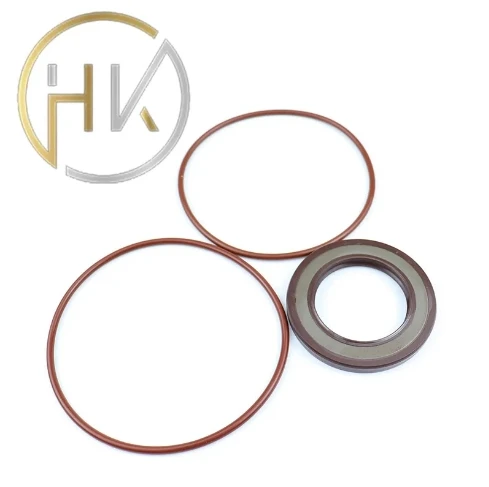Nov . 30, 2024 17:46 Back to list
Rotating Shaft Oil Seal Applications and Benefits in Mechanical Engineering
Understanding Oil Seals for Rotating Shafts
Oil seals, also commonly referred to as shaft seals or radial seals, play a critical role in various mechanical systems. They are designed to prevent the leakage of lubricants from rotating shafts, while also keeping contaminants out. This article delves into the components, types, applications, and importance of oil seals in rotating shafts.
What is an Oil Seal?
An oil seal is a mechanical device used to seal the gap between a rotating shaft and its housing. The core function of an oil seal is to prevent the loss of lubricating oil while restraining dirt, dust, and other contaminants from entering the assembly. They are typically positioned at the interface where the shaft enters an enclosure, such as a gearbox, engine, or pump.
Components of Oil Seals
An oil seal consists of several key components 1. Seal Body Made from flexible materials like rubber, it creates a tight seal against the shaft. 2. Inner Lip This part contacts the rotating shaft, allowing for minimal friction while effectively sealing the lubricant. 3. Outer Ring Designed to fit tightly in the housing, preventing the seal from dislodging under pressure. 4. Spring Often included to reinforce the sealing lip against the shaft, it compensates for wear and maintains pressure.
Types of Oil Seals
Oil seals come in various designs, catering to different applications 1. Rubber Oil Seals Commonly used due to their cost-effectiveness and ability to resist a wide range of chemicals and temperatures. 2. Metal Case Oil Seals These provide additional strength and robustness, often used in heavy-duty applications. 3. Spring-loaded Oil Seals These include a spring to exert consistent pressure against the shaft, ideal for high-speed applications. 4. PTFE Seals Made from Teflon, these seals are highly resistant to extreme temperatures and chemical exposure.
oil seal for rotating shaft

Applications of Oil Seals
Oil seals are widely used across various industries. Some notable applications include - Automotive In engines, gearboxes, and axles to keep lubricants contained and protect against dirt and debris. - Industrial Machinery Employed in conveyor systems, pumps, and compressors to ensure efficiency and longevity. - Aerospace Critical in hydraulic systems and rotating machinery to maintain performance under harsh conditions. - Electronics Used in motors and other equipment to ensure the smooth functioning of rotating parts.
Importance of Oil Seals
The importance of oil seals cannot be overstated. A proper sealing solution is vital for several reasons 1. Preventing Lubricant Leakage Oil seals help maintain the right levels of lubrication, which is essential for reducing friction and wear. 2. Protecting Against Contaminants By keeping dirt and moisture at bay, they enhance the lifespan of machinery and components. 3. Increasing Efficiency A good seal improves the efficiency of machines by preventing energy loss associated with leaks. 4. Minimizing Downtime Effective sealing results in fewer breakdowns and repairs, thus reducing operational downtime.
Best Practices for Oil Seal Maintenance
To ensure the longevity and performance of oil seals, several maintenance practices should be followed - Regular Inspections Check for signs of wear, corrosion, and deformation that may affect the seal's performance. - Proper Installation Ensure that seals are installed correctly to avoid misalignment, which can lead to premature failure. - Monitor Operating Conditions Be aware of changes in temperature and pressure that could impact the integrity of the seal. - Use Quality Seals Opt for high-quality oil seals suited for specific applications, as inferior seals may lead to frequent replacements and increased costs.
Conclusion
Oil seals for rotating shafts are integral components that enhance the functionality and reliability of various mechanical systems. Understanding their design, types, applications, and maintenance can lead to more efficient operations and extended equipment lifespans. By prioritizing the use of quality seals and following proper maintenance practices, industries can ensure that their machinery continues to operate smoothly and efficiently for years to come.
-
Wiper Oil Seal: Our Commitment to Clean Hydraulics
NewsAug.13,2025
-
Hydraulic Oil Seal for Self Discharging Cars
NewsAug.13,2025
-
Hub Oil Seal for Agricultural Tractor Hubs
NewsAug.13,2025
-
Skeleton Oil Seal with NBR Material
NewsAug.13,2025
-
Rotary Lip Seal for High Pressure Applications
NewsAug.13,2025
-
Cylinder Seal Kits Our Legacy of Hydraulic Trust
NewsAug.13,2025
-
Unlocking the Potential of Hydraulic Systems with Essential Sealing Solutions
NewsAug.06,2025
Products categories
















